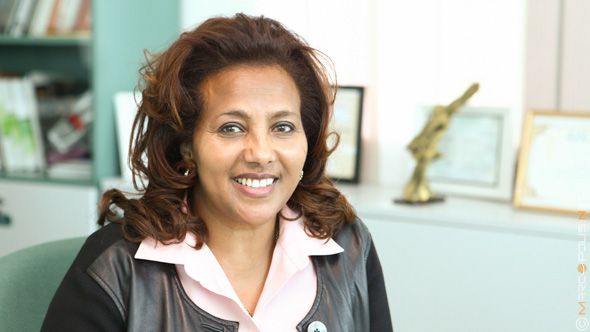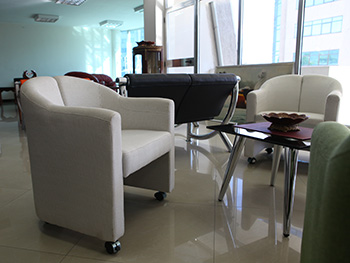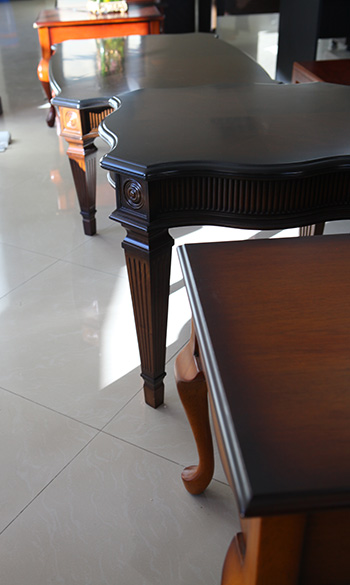Technostyle, a leading importer and supplier of furniture in Ethiopia, to start manufacturing locally
Amelework Ghidey, Managing Director of Technostyle
Being in the business for the last 15 years, Technostyle has managed to indentify its niche market and moved itself up the ladder to become the leader in the import and supply of furniture in Ethiopia. The company is also involved in interior design, offering unique turnkey interior solutions. By relying on the young returnees educated abroad, Technostyle aims to increase their productivity by 300% in the next five years. While currently importing from more than 15 international companies (Turkey, Italy, Malaysia, China, Singapore, Indonesia and America), Technostyle now wants to focus on local manufacturing by using 60% local materials from Ethiopia.
Interview with Amelework Ghidey, Managing Director of Technostyle

Can you please give us a brief history of Technostyle and how you have become the leading brand in furnishings and interior design?
We first started Technostyle 15 years ago; we just celebrated our 15th anniversary about a month ago. When the company started, it was just me with two graduates I employed from the university. They are still with me; one of them is the Deputy Managing Director and the other one is in charge of design. We started by importing half a container from here and there. The last 15 years we have been growing by an average of 20 to 25% each year.
Our company came at the right time when the middle class was rising and there was an explosion of globalization. The economy and policy of Ethiopia was also changing. So we have done very well the last 15 years. We have a strategic plan for the next five years and we are going to increase our productivity by 300% and our profitability by 200%. We know we are going to reach those goals because we have invested in all the necessary manpower and have visited many international factories, including those in China, Malaysia, Turkey, and Italy. We are trying to bring technology into it and are working on technology transfer. That’s where we are right now.
You have achieved some excellent growth. What has been the secret behind your success and do you see that growth continuing?
I really love what I do, I have a passion for what I do and I also have a purpose. As a woman, you first think you have a limitation. I come from a very hard-working family; both my mother and father are very hard-working and I have had many other hard-working people around me. Number one, they are my role models and the reason for my success. Number two, I really love what I do. I go to trade fairs, I see what is going on in the world, and I see what Ethiopia needs. We have really managed to identify our niche market so we work towards that and what they need. We study the market. We’re on top of it.
 Another important thing has been the change in government policy that encourages women entrepreneurs in particular to grow. The facilities are easier now than before. A lot of private banks have been emerging and so on. There is also a demand because the country itself is growing. I think we opened the company at the right time and so it was easier for us.
Another important thing has been the change in government policy that encourages women entrepreneurs in particular to grow. The facilities are easier now than before. A lot of private banks have been emerging and so on. There is also a demand because the country itself is growing. I think we opened the company at the right time and so it was easier for us.
To achieve a great business success, you need a good business plan as well as an efficient team to execute it. Can you tell us about your team?
In terms of our team, we have been developing our manpower and taking a lot of training. We started with three people and now we have about 230. We really try to focus on young, trained manpower when we hire. Whenever I travel, I take teams with me to trade fairs and to factories, so they are aware what is going on at the other end. We come back and we share this with our employees. We also spend money on training for our employees. We really invest a lot into human resources. As well, sometimes our suppliers will come here and train our people. We believe in technology transfer from abroad so we will bring suppliers to come here and train our people. That has helped a lot.
You mentioned that you have a lot of college graduates and I believe they are also behind the success of your enterprise.
We have a strategic plan and they are part of that vision. You can’t do much without a knowledgeable workforce. We have invested a lot in our manpower. We have different specialized training programs, including long-term and short-term training.
I also take different teams to trade fairs when we go to exhibitions so that they see factories and they have a vision of what we want to do. At the same time, we really have employed trained and qualified young people. When you came to my office, you saw some young women; one came from London and was trained in business development. The other one came from America and she did international business. We are also relying on the young returnees who were educated abroad.
Our company came at the right time when the middle class was rising and there was an explosion of globalization. The economy and policy of Ethiopia was also changing. We have a strategic plan for the next five years and we are going to increase our productivity by 300% and our profitability by 200%.
As I said, we have a five year strategic plan and we want to substitute our imports by investing in technology transfer and investing in establishing a factory. We want the products we make to be exactly the same quality as our imported products right now. You can see this chair is imported; we would have this same quality chair manufactured in Ethiopia, ready to be exported. That is our strategic plan for the next five years.
As well, the government’s five year growth and development plan has identified that manufacturing is a core solution to the growth of the Ethiopian economy. That’s where we come in. We are going to be part of the manufacturing sector. We are getting the necessary support in terms of land and finance and all the necessary advice. We are definitely going to go there. But educating our manpower is the main important thing so that we can walk together. If you have the vision together, you can walk together and you can reach your target together. We have a very clear objective and goal and we are all working together.
What are the divisions within Technostyle and which are the most profitable?
Technostyle is a leading importer and supplier of furniture and within that we have the finance division, import division, manufacturing division, supplies division, etc. We also have sister companies that work together with Technostyle, such as Atham. We identified that the need to open a sister company was important with specific objectives and goals.
For example, Atham was started mainly to focus on interior design. We call it turnkey interior solution. That’s where the missing link was – we wanted to supply furniture to our clients, but there was something missing so we created this company and this company identifies the problem. For example, if you build a new office building, you don’t have to do anything further; you just have to give us the key and we will come to you with different options and budgets. As I said, we call it turnkey. We do the color scheme, the lighting, the furniture, and space planning. You can give us a small office and we plan that office in order for you to use it the way you want to. That’s a very important company now.
In terms of profitability, it used to be imports because supply and demand is what always governs profitability. Our demand was higher for imported furniture but right now with the government policy and also with the quality of products that are manufactured locally, we have to restructure ourselves and focus not on short-term objectives, but long-term objectives such as import substitution. For example, we may want a state-of-the-art leather sofa. Ethiopia has a livestock supply that is number one in Africa and is maybe eighth or tenth in the world.  We used to export a lot of hide but now many factories are changing into semi-finished and good quality finished leather producers. We want to use that leather and manufacture our beautiful office swivel chairs and sell them back to people who were exporting this type of product to us. That way, instead of using foreign currency to import items, we get foreign currency to export, including leather sofas. This is our plan. We used to import sofas but now, give us two years and you will find a better-quality leather manufactured locally.
We used to export a lot of hide but now many factories are changing into semi-finished and good quality finished leather producers. We want to use that leather and manufacture our beautiful office swivel chairs and sell them back to people who were exporting this type of product to us. That way, instead of using foreign currency to import items, we get foreign currency to export, including leather sofas. This is our plan. We used to import sofas but now, give us two years and you will find a better-quality leather manufactured locally.
Of course we also import technology. There will be a technology team that will assist us in the technology transfer, but our goal is to manufacture not only for local use, but for export as well. If we start importing it is fine but not for sustainability. We want to be sustainable in our business and we have to substitute imported goods. Right now there are numerous incentives for manufacturers such as the government giving access to land and financing, so we are trying to grab that opportunity. We want to be one of the leading furniture and accessory exporters from Ethiopia.
What percentage of your business consists of interior design and what strategy are you executing to gain more market share locally and internationally?
Interior design as such is a concept that comes with globalization. Traditionally, Ethiopians like very nice coordinated things. That’s our culture. We like coordinated cool colors and something that doesn’t shine. Interior design by itself is a huge discipline. What we do is we try to coordinate an office properly where there are too many colors to coordinate. Basically, 60 or 70% of our business has something to do with interior design because people will give us their office, and then we design it for them, including color coordination and mix and match at various budget levels. We still need to develop the interior design concept. The world now likes simple furniture with 20 or 30 people in the same room. We are introducing that concept to Ethiopia and it’s really good. I think we are reaching this slowly but surely.
Technostyle is one of the biggest importers of fine furniture in Ethiopia. Do you have any plan to enter the export market and which market have you identified?
That is a very good question. As I said, we have been importing office furniture for the last 15 years. We import from around 15 or 16 companies worldwide including from Turkey, Italy, Malaysia, China, Singapore, Indonesia and America. Right now we have identified the products that we want to manufacture locally and export. We want to use at least 60% local materials in our manufacturing in order to call it import substitution.

The first thing we did was we began talking about joint ventures. We talked to two or three companies and the government also has different plans where they take your business to business meetings they are attending. So far we have had very promising requests from Dubai, from the UAE, and also from Saudi Arabia. We have also had very promising requests from Italy. As you know, Italians used to make their products locally but now because of labor costs, most of their products are made in China. Now their eyes are in Ethiopia or elsewhere in Africa. They were saying if you can produce high-quality goods, then if they have orders from Africa or anywhere, then they could ship it from here because it’s going to be their design. They will control the design and it will be quality-controlled. Their market will be whatever they get but they want us to be a sourcing company.
IKEA has well-known furniture and they get it from all over the world; Ethiopia supplies IKEA but when you go to IKEA you don’t know which product is from Ethiopia or Nigeria. In the same way, our furniture suppliers have a big trading house; it’s huge and you don’t know which sofa comes from where but they definitely have it manufactured where they can get cheaper labor and good-quality products. I think we have identified one or two companies that are willing to work with us and we are working towards that.
You also sit on the Board of Directors of the local Chamber of Commerce and you are one of the founders of Enat Bank, a bank that was established by Ethiopian women entrepreneurs. Can you tell us about the experience and what you have learned from that?
I will start with Enat Bank. When Enat Bank started, there was a small meeting at the Sheraton about women that was organized by an NGO called Caway. People were talking about different things such as if women could have access to land, if women could have access to this and that, and one or two of my colleagues were saying that women need access to finance. That is the most important thing. In this country, banks need collateral for you to borrow and for most of the equity and collateral, culturally, the title is under the man’s name. So even if the man is willing to have the woman work, that title deed is already tied to his business and a certain bank, so most of the women don’t have that to rely on.
We discussed that if we could get access to finance, we could create miracles, so we decided to start something. There were eleven women who started Enat Bank as founders and promoters. It was a tough ride. We had to meet eight hours around the clock, but our vision was very strong. We were looking at thousands and thousands of women who could really change their lives. We started Enat Bank and that’s where I really learned that if you are determined, you can make things happen. Raising that much capital was not an easy thing to do. To our surprise, because people were saying maybe we would be discouraged because we were women, we got most of our support from the men. They were saying “go” and they were assisting us, so we were really encouraged.
As a woman, you first think you have a limitation. I come from a very hard-working family; both my mother and father are very hard-working and I have had many other hard-working people around me. Number one, they are my role models and the reason for my success.
There were people who said that women talk about things but don’t do them and that was our driving force. We can never let our daughters down and we have to make it. If we started this vision and did not complete it, it would not be a good example to a lot of women. Definitely, a lot of things changed in this country once we started that bank. Even in the banks and the private sector it became a very important issue. We were also really encouraged by the government, by the civil servants and by our colleagues. They were encouraging us. What I learned from that bank is if you are really determined, if you are ready to sacrifice, you can have it. Nothing is impossible but you have to have the right goal and the right method.
When it comes to the Chamber of Commerce, I am a member of the Addis Ababa Chamber of Commerce. I have enjoyed working with my colleagues. It’s a very, very good place to be if you want to be aware of what is happening in business. The Addis Ababa Chamber of Commerce is really doing great things. Now instead of just being quiet, the government officials are ready to change policies and focus is on policies and strategies, so if we ask for appointments, they will give them to us. We will have conferences as well. So we have made a lot of significant change with the Addis Ababa Chamber of Commerce.
Also recently, there was recently a board member there for the first time at the Ethiopian Corporate Governance Institute, which has a goal of doing business ethically. Technostyle signed and we were one of the first 60 companies to sign; we are going to do things the right away. We are going to do things ethically; we are not going to be corrupted and we are not going to corrupt. We are going to rise up and do things ethically. I am also one of the board members of the Ethiopian Corporate Governance institute. So, I am learning. I am still learning. I also want to go back to school for short and long-term training. I enjoy what I do. Whatever I do, I enjoy what I am doing and I am blessed. I thank God and I have beautiful daughters who are supportive and sons who are supportive and family and friends who are very supportive. I think that’s how it is.
What is your vision for Technostyle over the next five years?
I have a very clear vision for Technostyle. I’m not bragging but I’m saying Technostyle will not only be number one in Ethiopia, it will be a very significant and well-known company in Africa in the next five years. This is because we have identified and studied the market that can make us different from the others and that can make us stand out from the other competitors. Technostyle will excel. You are going to hear about Technostyle in the next five years, maybe globally and not only locally. We have achieved our vision so far. Fifteen years ago, we said we’d be here and God has helped us to be here. After five years we are going to be substituting imports and we are not only going to be substituting imports for local consumption, but also for export. We have very good quality furniture using 60% local material.
What is the role that Technostyle plays in terms of social responsibility to your communities?
In terms of social responsibilities in communities, we have a lot of significant things that we do. But that is between you and the reason that drives you to do that. I could tell you that we have children that we are paying for their schooling, that we have this orphanage we are assisting, and various things. I can assure you that we are responsible socially and people who know us and organizations who know us, know that. I believe when you are here in this world, you have a purpose to fill. One injera is enough for you, but when you are here, you should be a reason for others to be someone as well. That is our motto and that’s what we believe in.
In terms of telling you about numbers of this and that, I really don’t like talking about that. We are very socially responsible and we participate in many social responsibilities. We also have our own department that deals with this and some very significant activities that we are doing with the company. We really have a vision to work further with women and children, with women who could create miracles but our lecture is their necessity, women who have kids and with a small amount of training they could support their kids. So we have a big vision when it comes to that. We are involved in so many things but I really don’t like when people advertise what they do and what their company does. Otherwise, it’s useless. You just do it for being popular. So, usually I don’t answer those questions because I do it for my God, for myself and for my community. That’s personal.
What inspiring message would you give to any woman out there who might be watching this video and who is thinking about starting something?
As a woman, I believe that if we are convinced that men are not our enemies, they could be supportive; they could be supporting our arms. But we have to make a clear vision ourselves first. We have to know what we want to do and set our mind to it and be determined to do what we want to do. I don’t think we have limitations. We have more responsibilities of course. I don’t like to say that women should abandon their domestic responsibilities or raising their children and just be aggressive. We are not in competition. We should collaborate. My role as a mother to my children is very important; I could never substitute it with anything else. But I can still be a good mother and a good wife and a good businesswoman. I think that women just need to set their goals and objectives properly.
I also want to say that this is the right time to come and invest in Ethiopia for women especially. Most of the doors are open. If you go to any government office, the doors are open. The economic empowerment of women means empowering the family which means empowering society. Empowering society means empowering the country at large. So, the government is focused on that and people are aware so everything is open. This is a time for women to come and really start to do something and not to give up. I’ve noticed that women don’t like borrowing money from the bank. It’s good – don’t borrow if you don’t know what you want to do with it. But if you really have your objective set properly and if you have a proper business plan, if you borrow money then that money will pay off your debt and give you profit. So I think we have to work on educating our women more and empowering them socially, economically and financially.
There is a passion that you have – a passion and determination.
FAIR USE POLICY
This material (including media content) may not be published, broadcasted, rewritten, or redistributed. However, linking directly to the page (including the source, i.e. Marcopolis.net) is permitted and encouraged.